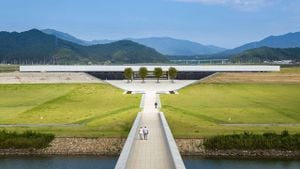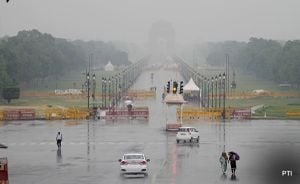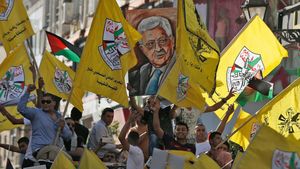Montreal was the stage for the first of two pivotal Liberal leadership debates, held entirely in French, on February 24, 2025. The event drew the party's four main candidates: former Bank of Canada governor Mark Carney, former finance minister Chrystia Freeland, former government House leader Karina Gould, and businessman Frank Baylis. This high-stakes debate came just two weeks before the Liberal Party's decision on its new leader, to succeed Prime Minister Justin Trudeau on March 9.
With the backdrop of increasing tensions between Canada and the U.S., largely attributed to U.S. President Donald Trump’s tariff threats, candidates outlined their platforms across several significant themes, including Canada-U.S. relations, economic growth, affordability, health care, and climate change. According to Liberal Party president Sachit Mehra, the debate themes were selected by registered Liberals. "You never know what will come up," remarked the debate moderator, former CBC journalist Hannah Thibedeau, setting the scene for what was expected to be a lively exchange.
The contest had recently tightened when Ruby Dhalla was disqualified just days prior to the debate, following allegations she broke party rules. Dhalla expressed her disappointment on X, stating, "I love Quebec and was looking forward to sharing my vision during the debate." The disqualification marked yet another twist as the remaining candidates geared up for their respective challenges.
Mark Carney arrived to cheery supporters outside the debate venue, where about twenty advocates stood waving red signs bearing his logo. His supporters displayed enthusiasm, albeit without the ability to participate directly within the event space. Despite the excitement, Carney opted not to engage the press on-site.
Among the candidates, Carney is seen as the frontrunner after gaining traction particularly among Quebec voters. Pollster Jeremy Ghio suggested, "What people are looking for after nine years of Justin Trudeau is maybe calm and reassuring. Mark Carney looks calm and looks reassuring." His popularity stands out in Quebec, where sentiments appear to be shifting, as voters increasingly lean away from the Bloc Québécois and gravitate toward the Liberals. "It’s a complete 180 right now for the polling intentions in Quebec," added Ghio.
Freeland, known for her pivotal role as the Minister of Finance and her previous experience negotiating key trade deals, maintains significant influence within the party. She is perceived as Carney's main competition and has emphasized her commitment to tackling pressing issues facing Canadians.
Karina Gould, at just 37, is the youngest candidate with multiple cabinet portfolios under her belt. Her fluency and experience within the government make her a strong contender, particularly appealing to younger voters and those favoring progressive policies. Meanwhile, Frank Baylis, leveraging his engineering background and business acumen, aims to connect practical solutions with the party’s traditional liberal values.
Going head-to-head on the debate stage, candidates will respond to identical questions posed during the live-streamed event, which is expected to engage not only party members but the wider public seeking insight on potential leadership directions. The logistics entail one-minute responses followed by lively five-minute debate intervals—where much of the unpredictable discourse could thrive.
Thibedeau noted the increased pressures on candidates as they step onto the debate stage. "The big names decided not to run... So you look back, Jean Chrétien, Justin Trudeau, Mr. Martin— they were all from Quebec. This time around, you see them from different parts of the country and Mr. Baylis, of course, is a businessman from Montreal." This shift reflects broader changes within the party’s structure and its response to changing demographics and preferences of potential voters.
The atmosphere is charged as the candidates prepare to articulate their plans against the backdrop of Trump's looming trade policies and broader economic anxieties. While Carney’s messaging has muddled at times, particularly around his stances on pipeline development, it's clear he will aim to solidify momentum as the debates continue.
Following the French debate, the candidates will return to the stage on February 25 for the English-language discussion, where the same themes will be thoroughly explored. Both debates are set to provide insight and clarity on what Canadians can expect from the Liberal party moving forward, especially with federal elections potentially on the horizon.
Overall, these debates mark not only an opportunity for the candidates but also serve as pivotal moments for the Liberal Party as they navigate their future direction amid increasing competitive pressures from Conservative opponents. The choices made on this stage could heavily influence not just internal party dynamics but also set the tone for upcoming elections.



